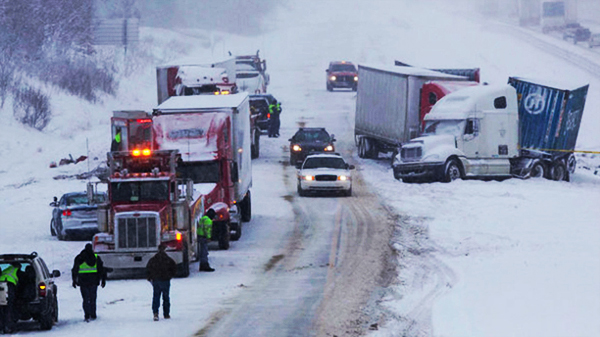If Life Was Like A Box Of Chocolates, It Is No More

 Feds Set To Mandate “Black Box” Data Recorders In Every Single Car And Truck including yours, yours and yours too….Yes yours too!
Feds Set To Mandate “Black Box” Data Recorders In Every Single Car And Truck including yours, yours and yours too….Yes yours too!
WASHINGTON – Many motorists don’t know it, but it’s likely that every time they get behind the wheel, there’s a snitch along for the ride.
Today is the last day that the public can comment on a proposed law that would put so-called black boxes in every new car sold by September 1, 2014. The thing is, most cars already have them unbeknownst to many drivers.
Automakers have been quietly tucking the devices, which automatically record the actions of drivers and the responses of their vehicles in a continuous information loop, into most new cars for years.
When a car is involved in a crash or when its airbags deploy, inputs from the vehicle’s sensors during the 5 to 10 seconds before impact are automatically preserved. That’s usually enough to record things like how fast the car was traveling and whether the driver applied the brake, was steering erratically or had a seat belt on. This data has been used recently, for example, to determine what was happening in cars before accidents when some Toyota owners were claiming their cars were accelerating out of control as they were driving.
The idea behind mandating black box data recorders is to gather information that can help investigators determine the causes of accidents and lead to safer vehicles. But privacy advocates say government regulators and automakers are spreading an intrusive technology without first putting in place policies to prevent misuse of the information collected.
Data collected by the recorders is increasingly showing up in lawsuits, criminal cases and high-profile accidents. Massachusetts Lt. Gov. Timothy Murray initially said that he wasn’t speeding and that he was wearing his seat belt when he crashed a government-owned car last year. But the Ford Crown Victoria’s data recorder told a different story: It showed the car was traveling more than 100 mph and Murray wasn’t belted in.
In 2007, then-New Jersey Gov. Jon Corzine was seriously injured in the crash of an SUV driven by a state trooper. Corzine was a passenger. The SUV’s recorder showed the vehicle was traveling 91 mph on a parkway where the speed limit was 65 mph, and Corzine didn’t have his seat belt on.
In this way, the black boxes can nail liars trying to blame their cars for bad driving.
There’s no opt-out. It’s extremely difficult for car owners to disable the recorders. Although some vehicle models have had recorders since the early 1990s, a federal requirement that automakers disclose their existence in owner’s manuals didn’t go into effect until three months ago. Automakers that voluntarily put recorders in vehicles are also now required to gather a minimum of 15 types of data.
Besides the upcoming proposal to put recorders in all new vehicles, the traffic safety administration is also considering expanding the data requirement to include as many as 30 additional types of data such as whether the vehicle’s electronic stability control was engaged, the driver’s seat position or whether the front-seat passenger was belted in. Some manufacturers already are collecting the information. Engineers have identified more than 80 data points that might be useful.
Privacy complaints have gone unheeded so far. The traffic safety administration says it doesn’t have the authority to impose limits on how the information can be used and other privacy protections. About a dozen states have some law regarding data recorders, but the rest do not.
“Right now we’re in an environment where there are no rules, there are no limits, there are no consequences and there is no transparency,” said Lillie Coney, associate director of the Electronic Privacy Information Center, a privacy advocacy group. “Most people who are operating a motor vehicle have no idea this technology is integrated into their vehicle.”
Part of the concern is that the increasing computerization of cars and the growing communications to and from vehicles like GPS navigation and General Motors‘ OnStar system could lead to unintended uses of recorder data.
“Basically your car is a computer now, so it can record all kinds of information,” said Gloria Bergquist, vice president of the Alliance of Automotive Manufacturers. “It’s a lot of the same issues you have about your computer or your smartphone and whether Google or someone else has access to the data.”
The alliance opposes the government requiring recorders in all vehicles.
Data recorders “help our engineers understand how cars perform in the real world, and we already have put them on over 90 percent of (new) vehicles without any mandate being necessary,” Bergquist said.
The National Transportation Safety Board has been pushing for recorders in all passenger vehicles since the board’s investigation of a 2003 accident in which an elderly driver plowed through an open-air market in Santa Monica, Calif. Ten people were killed and 63 were injured. The driver refused to be interviewed and his 1992 Buick LeSabre didn’t have a recorder. After ruling out other possibilities, investigators ultimately guessed that he had either mistakenly stepped on the gas pedal or had stepped on the gas and the brake pedals at the same time.
Some automakers began installing the recorders at a time when there were complaints that air bags might be causing deaths and injuries, partly to protect themselves against liability and partly to improve air bag technology. Most recorders are black boxes about the size of a deck of cards with circuit boards inside. After an accident, information is downloaded to a laptop computer using a tool unique to the vehicle’s manufacturer. As electronics in cars have increased, the kinds of data that can be recorded have grown as well. Some more recent recorders are part of the vehicle’s computers rather than a separate device.
One day when you sit down with your grandchildren you will tell them stories about when we were all free, how we used to be able to watch TV without being watched by a Smart TV, how we could drive in our cars and have a personal conversation without anyone listening to us, walk around our home with the curtains closed and know that no one could see us, will they even understand the word “FREEDOM“ who knows it may even become a crime use the word freedom. – WHISNews21
Below I have posted just a few comments from concerned American’s
People seem to be forgetting that the good thing about living in the United States is that (at least, theoretically) the people are supposed to control the government; the government is not supposed to be controlling the people. If a person wants to live in a country where the government tells the people what to do, by all means they should go there.
-=-=-=-=-=-=-=
I think it is an invasion of our privacy and the fact that it already exist in many cars unknown to the owners is unthinkable. We have the right to decide if we want this new techology and if we want the government spying on us (don\’t do this, it is just WRONG)!
-=-=-=-=-=-=-=-
Welcome to Obama and the Democrats new America. Black boxes in cars and soon you will have to register your guns so the government knows who has what weapons.
-=-=-=-=-=-=-=-
So what happens if THE GOVERNMENT passes a law against something you like to do. Perhaps something like Internet comments they deem seditious like compareing THE GOVERNMENT to “Big Brother”. Then they could be coming after you
-=-=-=-=-=-=-=-
the black box will lead to safer vehicles they claim? ROFL, you mean, its another way and device the insurance company can have and use to get out of paying for the accident if the driver of the car has there insurance!
-=-=-=-=-=-=-=-
There were just too many comment but the last I read I will list below it is direct and to the point..



Comments are Closed